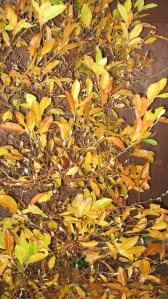If April is the cruellest month, November is the glummest. The mists and mellow fruitfulness have given way to damp, dull, dreariness. The fires of autumn have been extinguished by the cold rain, and the colours in the garden are 50 shades of brown.
November is an in-between sort of a month. It’s not yet time to start fully panicking about Christmas, although there’s a nascent sense of unease about it all. It’s not yet the full-on hibernation season that January offers. It’s not the crisp mornings and vibrant colours of October.
The allotment is languishing too, although I have planted onions and garlic in a defiant statement of belief in next year – the gardening equivalent of a two-fingered salute to this year’s rotten weather.
I shouldn’t be too hard on old November though. Last week I spent a full seven hours at Wisley garden, where liquidambars and acers were still in full radiant colour. A few days later there was a glorious frosty morning. I went running through the sunny countryside, watching the deer bound away ahead of me, a green woodpecker flying across my path, mist rising gently from the chilly lake. The decent days when they come are so much more special.
Today, gardening for the old folks has been rained off, which means missing the green bin collection, which means there’ll be too much to go in next time. An afternoon walk with a friend has also been scrapped. On one level, extremely frustrating.
But that means unexpected extra time for writing, music, and hunkering down with butternut squash soup and fresh bread and good company. The Autumn Soup Hunkering Season starts here.
Self-medicating with roast vegetables, red wine and chocolate is an excellent cure for ailing General Outdoors Types who are stuck indoors on long evenings.
And if you do wander round the soggy garden, the buds bearing promises of next year’s flowers are already there. Hidden beneath the soil, the shoots of the daffodils are secretly pushing their way skywards. Stuff is still happening during in-between seasons – it’s just a lot harder to see and to believe.
Anyway I’m guessing it was on a gloomy day like today when Thomas Hood wrote this poem. Spring is a few short months away, but for now it’s November.
No sun – no moon!
No morn – no noon –
No dawn – no dusk – no proper time of day.
No warmth, no cheerfulness, no healthful ease,
No comfortable feel in any member –
No shade, no shine, no butterflies, no bees,
No fruits, no flowers, no leaves, no birds! –
November!






